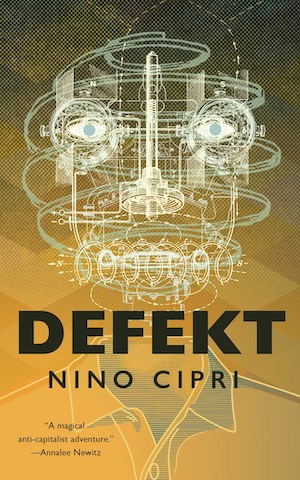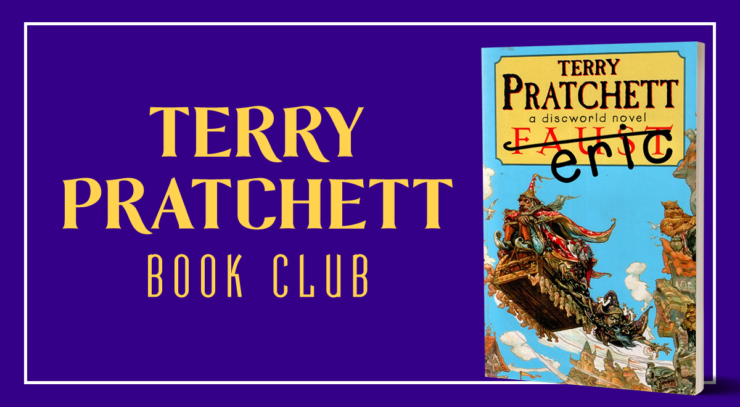Let’s get Faustian. (Literally.) It’s time to meet Eric…
Summary
Death is tending to his bees when there’s a breeze in his realm and the sound of feet running and someone going on about how they don’t want to die. The Unseen University also detects this, but the Archchancellor falls asleep before getting anything done about it, so the Bursar tries to figure out what to do and settles on the Rite of AshkEnte. They summon Death, who explains that Rincewind is the reason this is happening, as he’s trying to get back from the Dungeon Dimensions (see: the end of Sourcery). But he also tells him that the chances of that happening are exactly a million to one. That chance has, in fact, happened. Rincewind is summoned to a young demonologist’s house, and the young man—named Eric Thursley—demands that Rincewind grant him three wishes: mastery of the kingdoms of the world, to meet the most beautiful woman who ever lived, and to live forever. He does not believe that Rincewind isn’t a demon. The wizard can’t put his finger on what’s off about Eric until he realizes that he’s just thirteen years old.
Buy the Book


Defekt
Eric heads downstairs for breakfast, and Rincewind realizes that the bird he’d assumed was stuffed is in fact a live parrot. It tells him that Eric’s grandfather manages to summon actual demons, but Eric is spoiled by his parents and they let him mess with grandpa’s old stuff. Down in the Disc’s version of Hell, Lord Astfgl is irate because he’d been waiting for Eric who get through to Pandemonium, and had already selected the demon Vassenego to go tempt the kid, but the demon didn’t make it. Eric decides he should just let Rincewind go, but right as he’s made the decision, the Luggage drops in. Eric reasserts his demands, and Rincewind balks, claiming he can’t just snap his fingers and makes things happen—except then he snaps his fingers and things just start happening. He and the Luggage and Eric and the parrot are suddenly suspended above the Disc, looking over the world. Eric says if he’s master of the world as he asked, he wants tribute. So Rincewind snaps again, and they arrive in the jungles of Klatch, near the Tezuman Empire.
They meet some of the people of the Tezuman Empire and Rincewind manages to communicate to them that Eric wants tribute, so they are taken to the city where there is a feast and celebration and a ton of treasure. Rincewind has a feeling it can’t all go this right, and has a look around. He comes across a statue of their god Quezovercoatl (who is actually a proper demon), and behind it a prisoner named Ponce da Quirm, who is there to be sacrificed. Quirm happens to know that the Tezuman also have special sacrificial plans for the Ruler of the World, and the fellow who shows up with him. As they’re about to be sacrificed the next morning, Quezovercoatl shows up (he’s been advised by Lord Astfgl to change the religion to something less bloody and depressing), revealing himself to be only six inches high. The Luggage shows up at the same time, runs to Rincewind, and squashes the demon “god” flat. The Tezuman let the three prisoners go, Rincewind gives the parrot over to da Quirm, and the Tezuman decide that the Luggage is their new god.
Rincewind snaps his fingers and they arrive somewhere else that is not Eric’s home. They exit the space and turn out to have climbed from a large wooden horse’s ass. They are assumed to be Ephebians, as they are in Tsort and there’s the war going on. The Tsortians are very confused as to why there were only two people in the horse when they were expecting a hundred. Eric realizes that they’ve been sent back in time to the Tsortean Wars where Elenor was kidnapped from the Ephebians. An attack begins outside and Rincewind suggests that their guard leave to see what’s up, telling Eric they should get away from here fast as possible.
Commentary
I definitely have not read this one before. So this should be interesting.
Okay, so this book is a straight up parody of a lot of classical literature and myth, sort of similar to all the parodies Rincewind goes through in The Colour of Magic. The overarching parody here is obviously Faust, to the point where his name is scratched out in the title. Which… kind of feel like that doesn’t work? Maybe if Eric’s name was closer phonetically to Faust instead, but obviously that’s not as funny as him having a super typical name like Eric. I dunno.
Maybe this is a weird thing for me to say, but there’s some part of me that wonders if writing the Good Omens version of Death didn’t clarify some things for Pratchett about the Discworld version. Because his very first appearance in The Colour of Magic is notably not quite there yet, and obviously we get a lot of him in Mort, and he continues to coalesce with every additional appearance. But there’s something about this particular bit with the Rite of AshkEnte that feels just exactly correct, like the Discworld’s Death has finally distilled down or aged appropriately like a fine wine—his being on the wrong side of the octogram, the “expression of polite interest,” the expectant curiosity whilst being very to-the-point. (Picking invisible particles off the scythe, I could die.) When I think of the character, this is how I’m usually thinking of him.
I dare say (did I just type those words? I don’t think I’ve ever done that before) there’s a lot of Good Omens influence in this book, particularly in the explanation of Discworld’s Hell, and Lord Astfgl’s mission to make the whole thing function better. (Plus his petty grievances with the old guard of demons.) It’s there in the talk of how Astfgl wants Eric because Hell is missing out of human imagination, giving Pratchett a spot to really drill down on that concept. There’s the mention that the difference between gods and demons on the Disc is basically the same as the difference between “terrorists and freedom fighters,” which immediately puts me in mind of Crowley and Aziraphale’s conversation about guns and moral arguments. Then there’s the “bell, book and candle job” line, which has that air of echoes in the brain working their way out, and I have to say, it’s comforting? Obviously writers don’t usually mean to repeat themselves, but if someone like Pratchett can do it, we can all feel a little less awkward when we do it.
But I feel like the real crux here is the moment when Rincewind is looking at Eric looking out over the world and he wonders if he was like him at that age, and then thinks “I wonder how I survived?” The original conceit of Faust is about an adult man who’s pretty fed up with how his life has gone, and I find it interesting that Pratchett doesn’t bother with that at all. Obviously, it would be less interesting to pair Rincewind—himself a bitter-ish fellow who’s seen a lot—with someone of the same temperament, but it also feels as though this is part of the point in retelling this story. The idea that it makes more sense when the person making these mistakes in summoning a demon and asking for outrageous things is a kid who hasn’t got a clue.
Of course, the Tezuman Empire has a lot of similarities to the Aztec Empire, and while Pratchett does some of this rendering well, it’s got similar issues to how he handled Egyptian-based culture in Pyramids. There’s the jokes around glyph languages, the ribbing about using stone instead of paper, calling his own version of Quetzalcoatl a “feather boa,” and Ponce da Quirm who is clearly a stand-in for Juan Ponce de León. Not sure if he’s going to show up later in the book, but the way he’s rendered in this section is just as some guy who is looking for the fountain of youth. Which is not what we should remember de León for—not when he did his best to subjugate native peoples just like Tezuman.
On the other hand, I appreciate the fact that Eric’s wish to be ruler of the world almost gets him killed by the Tezuman because these people mean to do the opposite of worshipping anyone who claims that title. It reminds me a little bit of how it works out in The Road to El Dorado, where it’s made very clear that Chief Tannabok knows Miguel and Tulio are just two guys and definitely not gods, but he plays along because their presence might help him oust their high priest who is big on sacrifice. You can tell it’s a story written by white people, though, in both cases.
Then we get promptly thrust into a parody of the Trojan War, so we’ll see how that plays out next week. But I do so very much appreciate their exit from the wooden horse.
Asides and little thoughts:
- Look, sometimes the footnotes are on, and then sometimes they’re on, like the one about the Unseen University’s erotic books, and how they’re just erotic, not kinky, which is “the difference between using a feather and using a chicken.” The longer you sit with that one the funnier it gets; it just creeps on you.
- The initials of the book Eric uses to summon Rincewind—the book of absolute control—come out to MS DOS, a joke that does not play at all today, and makes me love it more?
- The weapon that Rincewind thinks would likely be described as a “primitive sword,” but he finds far more deadly indeed is the macuahuitl, a devastating weapon that easily rendered opponents incredibly injured or dead. It has similarities to a broadsword, sure, but there’s nothing primitive about how effective that weapon is at maiming people, and it was invented before the broadsword.
Pratchettisms:
Like all beekeepers, Death wore a veil. It wasn’t that he had anything to sting, but sometimes a bee would get inside his skull and buzz around and give him a headache.
His nose, feeling that it was being left out of things, hastened to report a whiff of brimstone.
But it wasn’t all that strange, because any wizard bright enough to survive for five minutes was also bright enough to realise that if there was any power in demonology, then it lay with the demons. Using it for your own purposes would be like trying to beat mice to death with a rattlesnake.
There was a sound behind them, like the universe clearing its throat.
Rincewind gave his fingers a long shocked stare, as one might regard a gun that has been hanging on the wall for decades and has suddenly gone off and perforated the cat.
Next week we finish the book! It’s a fast one. See you then!










